|
Albany – On June 24, 2022, the U.S. Supreme Court cast aside almost 50 years of legal precedents when it issued the devastating ruling to overturn Roe v. Wade, leaving the regulation of abortion up to each state. The Dobbs ruling had immediate implications for access to abortion services, and barriers to obtaining care have increased dramatically during the past twelve months. Residents of states with trigger laws and abortion bans have had their reproductive freedom stripped away, even though abortion care is essential health care and 85% of individuals in the U.S. support abortion remaining legal and accessible. As has been reported, abortion bans have made it necessary for tens of thousands people to travel out-of-state for abortion care at significant cost. Implementing bans has placed the health, fertility, and lives of pregnant people at risk, while forcing health care providers to choose between providing necessary medical care and facing arrest, hefty fines, or loss of licensure. We were forewarned by Justices Sotomayor, Breyer, and Kagan in their joint dissent that the right to contraception, same-sex intimacy, and same-sex marriage are also in jeopardy. "New York has long been a leader in protecting reproductive freedom," said BPCLC Co-Chair, Senator Liz Krueger. "Thanks to the support of the Governor, the Attorney General, and the Legislature, the state provides a safe haven where New Yorkers and residents of other states can access abortion services." "The Legislature, this session, took a bold stand for reproductive justice for ALL, New Yorkers and persons across the country," said BPCLC Co-Chair, Assembly Member Karines Reyes, R.N. "I am honored to serve in this legislative body and as co-leader of this Caucus, committed to protecting human dignity and liberty." BPCLC members have introduced leading-edge legislation to effectively address new and evolving threats to reproductive freedom following the Dobbs decision. Building on last year’s “shield” legislation, the following are bills introduced by BPCLC members in 2023 that have passed both Houses:
One year ago, the right to have a safe and legal abortion was eliminated at the federal level. Anti-abortion groups and lawmakers have been unrelenting in their attacks on reproductive freedom, passing increasingly restrictive and punitive laws, challenging federal policies, and even dismantling democratic processes in order to achieve their ultimate goal of a national abortion ban. It is up New York and other states that protect reproductive freedom to help women who have lost their rights to obtain the abortion care they need. We must also fight hard to establish true reproductive freedom throughout the United States. The mission of the BPCLC is to protect reproductive rights across the state, and provide a voice for pro-choice state legislators in policy debates at both the state and national level. The Caucus includes 126 members of the NYS Senate and Assembly.
###
0 Comments
On June 24, the U.S. Supreme Court announced its devastating decision in Dobbs v. Jackson Women's Health. In a 5-1-3 opinion, the Court overturned Roe v. Wade and Planned Parenthood v. Casey, ruling that the right to abortion is not afforded in the U.S. Constitution; and furthermore, states are able to regulate abortion in whatever manner they choose. Justice Alito wrote the majority opinion, with concurrence from Justices Kavanaugh and Thomas. Chief Justice Roberts agreed with upholding Mississippi's 15-week abortion ban, but he was opposed to overturning Roe and Casey. Justices Sotomayor, Breyer, and Kagan wrote a strongly-worded joint dissent, warning that the right to contraception, same-sex intimacy, and same-sex marriage are also in jeopardy.
This heinous, inhumane ruling was anticipated, especially after the draft ruling was leaked, yet it was shocking to hear, nonetheless. The Roe v. Wade ruling of 1973 established the right to choose as settled law and has been the legal precedent for close to 50 years. Please see the following resources for additional details about the Court ruling:
Since June 24, there has been a slew of pro- and anti-abortion legislative activity at all levels of government, as well as federal initiatives. The following resources can be used to monitor the national landscape:
Contents
This entry includes a high volume of information. Please click on the following links to go directly to the specified content further below.
Pro-Abortion Legislative Activity
Federal Legislation When the U.S. Supreme Court announced in 2021 that it would hear Dobbs V. Jackson Women's Health Organization, U.S. lawmakers responded by introducing the Women’s Health Protection Act (WHPA) (H.R.8296 Chu / S.4132 Blumenthal) to codify abortion rights into federal law. The WHPA passed the House on July 15 by a vote of 219-210 and moved to the Senate. The likelihood of passage in the Senate is unpromising, as the bill has already been blocked from advancing twice. On August 1, U.S. Senators Kaine, Murkowski, Sinema, and Collins announced the introduction of a “compromise” bill called the Reproductive Freedom for All Act, which establishes a right to abortion up to the point of viability. Post-viability abortion is permitted to protect the health of the pregnant person. The bill includes exemptions for health care providers with religious objections, protects access to contraceptives, and allows states to institute restrictions on post-viability abortion that are within reason without jeopardizing the health or life of the pregnant person. U.S. Senator Kaine stated that he sought to find common ground in order to protect abortion rights on the national level. NARAL Pro-Choice America issued a statement that the legislation is inadequate and does not address our “abortion rights and access crisis.” State Legislation In New York, there have been impressive legislative efforts on the State and City levels. When the draft Supreme Court opinion was leaked on May 2, BPCLC members took immediate action to fortify abortion rights and access in New York State. As a result of your dedication and hard work, we were able to pass the following legislation during the Regular and Extraordinary Sessions:
Thank you to the bill sponsors for carrying this important legislation and to all of you for your support in getting the legislation passed! As was acknowledged at the end of session, there will be additional legislative and policy issues to address in 2023 as the national landscape continues to evolve with the enactment of increasingly inhumane anti-abortion laws. Some of these areas could include:
Regarding protecting telehealth abortion providers, there is great interest in making abortion as accessible as possible for people living in states with abortion bans, while protecting NYS abortion providers from facing criminal charges, including murder. Providing telehealth medication abortion services across state lines would go a long way in expanding access to abortion care. We have not heard about a clear pathway to protecting these abortion providers from extradition and prosecution, however, due to complications surrounding the legal question of provider “presence,” interstate telehealth regulations, Full Faith and Credit and Federal Extradition Clauses, and the current composition of the U.S. Supreme Court. Reproductive rights advocates and legal professionals continue to research these issues and look for viable solutions. As your offices prepare for the 2023-2024 Legislative Session, we would like to share some reproductive rights legislative resources that have come to our attention:
City Legislation Following in the footsteps of the NYS Legislature, members of the New York City Council also worked quickly to pass the following abortion rights and access legislation, which was signed into law on August 12:
The NYC Council also voted to pass the following Resolutions:
For more information and to hear discussion on these bills and resolutions, you can view recordings of the NYC Council Committee on Women and Gender Equity hearing, the Committee vote on most of the legislative initiatives, a full Council vote, and the enactment of the 6 bills. To view bill/resolution language and actions, please click on the above legislative links. Return to Top
Anti-Abortion Legislative Activity
Federal Legislation There have been calls for a national abortion ban over the years, as well as since the Supreme Court ruling was announced. U.S. Representatives who seek to ban abortion are weighing in on existing bills as well as deliberating how far to go in their efforts to block access to abortion care should the GOP achieve a majority in the House next year and win the presidency in 2024. The following list of select anti-abortion legislation criminalizes abortion providers and other staff who violate bill provisions; establishes that the right to life begins upon fertilization; does not align with current medical research; defies standards of medical practice; and is inhumane.
If enacted, these bills would have drastic implications for reproductive rights, gender equality, and access to abortion and reproductive health care nationwide. Furthermore, as reported by National Advocates for Pregnant Women (NAPW), establishing fetal personhood has significant ramifications for Assisted Reproductive Technology (ART) services, access to contraception, medical treatment, criminal law, child support, and other areas (please see the NAPW issue brief for details). State Legislation Since the U.S. Supreme Court announced its ruling, a variety of anti-abortion state legislative activity has come into play, including: trigger bans, pre-Roe bans, previously enjoined anti-abortion laws, and new anti-abortion laws. Prior to Roe v. Wade being overturned, 13 states had trigger bans in place - previously enacted laws banning abortion that would take effect automatically or following a state action once Roe ceased to be the law of the land. These states include Arkansas, Idaho, Kentucky, Louisiana, Mississippi, Missouri, North Dakota, Oklahoma, South Dakota, Tennessee, Texas, Utah, and Wyoming (see this Guttmacher Institute article for additional details). In addition to trigger bans, 9 states have had abortion bans in place since before the Roe v. Wade ruling in 1973: Alabama, Arizona, Arkansas, Michigan, Mississippi, Oklahoma, Texas, West Virginia, and Wisconsin. As of August 1, the Michigan and Texas bans were not in effect due to being temporarily and permanently enjoined, respectively, by court order. These abortion bans have not been enforced, but that could change (see this Guttmacher Institute article for additional details). The national abortion landscape is rapidly changing as anti-abortion states work on activating the heinous abortion bans and restrictions they already had in place, as well as introducing new and increasingly inhumane legislation. As of August 17, 44 states do not allow abortion beyond a certain point of pregnancy (some of which provide exceptions), ranging from 9 states that prohibit abortion after conception to 17 states that do not permit abortion after 24 weeks of pregnancy, including New York (exceptions include if the pregnant person’s health or life are at risk, or if the fetus is not viable) (see this Guttmacher Institute article for additional details). To help guide new anti-abortion legislative initiatives, the National Right to Life Committee developed a Post-Roe Model Abortion Law document, which includes suggested provisions for how to prohibit abortion to the greatest extent possible. This document contains charged language, however, it is useful to be aware of when drafting abortion rights and protections legislation to help identify potential gaps. For timely news on reproductive rights, the following are several individuals who regularly tweet abortion rights updates:
It is anticipated that anti-abortion state legislative and policy agendas may also seek to ban telehealth medication abortion and/or medication abortion, criminalize self-managed and extraterritorial abortions, establish fetal personhood, prohibit access to contraception, including emergency contraception, prohibit insurance coverage of abortion care where possible, and increase the number of crisis pregnancy centers. We will continue to monitor emerging trends in anti-abortion legislation to ensure that we know what types of protections are necessary for abortion providers, helpers, and patients Return to Top
Federal Initiatives
The Biden-Harris Administration has called for passage of federal legislation to legalize abortion nationwide. Recognizing that there are not enough votes in the U.S. Senate to pass the Women’s Health Protection Act of 2022, President Biden has exercised Executive Authority to implement the following measures to protect abortion rights and access, and to protect women’s right to emergency reproductive health care services.
As this BPCLC update is being drafted, Texas already sued the U.S. Department of Health and Human Services over the EMTALA guidance, which directs health care facilities to provide emergency care to people who are experiencing pregnancy complications or who are having a miscarriage, even if it means performing a D&C. On August 23, a federal district judge in Texas issued a preliminary injunction against the EMTALA guidance, allowing pregnant people to be denied emergency reproductive health care services. It is clear that abortion rights and access to abortion care must be codified into federal law, but the pathway to achieve that goal is uncertain. Return to Top
Impacts of State Abortion Bans
It goes without saying that the slew of state abortion bans being enacted, as well as trigger laws being activated, will increase rates of unplanned pregnancy, including teen pregnancy, and maternal mortality and morbidity; place abortion providers, helpers, and patients at increased risk of being criminalized; and cause increased poverty among individuals and families. The harmful ramifications of these state bans, however, are far more widespread, including the ones described below. Impacts on Access to Abortion Training Abortion training is provided as part of OB/GYN residency programs, for hospital and clinic staff in some facilities, and certain clinics may host providers seeking clinical training. Abortion training may include medication abortion, other early abortion procedures, and later abortion procedures. The Accreditation Council for Graduate Medical Education (ACGME) sets standards for OBGYN residency programs across the U.S., including requirements for abortion training (surgical and medical, including medication abortion). An estimated 44% of OBGYN residency programs are located in states that will have abortion bans. It is essential that OBGYN residency programs include training in performing abortion procedures, even in states where abortion is illegal. ACGME is asking those states to support residents in getting this training in other states. If residents cannot travel, ACGME is asking states to provide didactic activities, including simulation, and assessment on performing a uterine evacuation (surgical and medical). The concern is that a percentage of OBGYN residents will learn how to perform abortion procedures, but will not have gained hands-on experience during their residency. ACGME is currently working on updating their Program Requirements for Graduate Medical Education in Obstetrics and Gynecology accordingly. Draft changes can be viewed here. The number of individuals who seek later abortions is relatively small – approximately 1% of abortions are performed after 20 weeks of pregnancy and 0.1% are performed after 24 weeks of pregnancy. It is anticipated that these percentages may go up due to pregnant persons having greater difficulty accessing early abortion procedures. The number of abortion providers who perform later abortions, as well as availability of later abortion training are both sources of concern. There are 11 clinics in the U.S. that provide later abortion services after 24 weeks of pregnancy. There is not as much readily available information online about later abortion training; it is believed that abortion providers receive training at host clinics where the procedures are performed. Administrative matters are presumed to be more complex for later abortion providers, including obtaining medical malpractice insurance and necessary security. Please see the following articles and resources for additional details:
Impacts on Access to Emergency Reproductive Health Care and Medications Immediately following the overturn of Roe, there was an increase in cases reported of pregnant people being refused emergency care for pregnancy complications and miscarriage management, as well as pharmacists refusing to fill prescriptions for certain medications. Pregnancy comes with many health risks, such as the potential for ectopic pregnancy, preeclampsia, infections, postpartum hemorrhages, high blood pressure, gestational diabetes, and miscarriage. Conditions such as these can threaten a pregnant person’s health or life, and require immediate treatment, which may include a D&C or abortion-related medication. State abortion bans have caused health care providers to turn away patients experiencing pregnancy complications unless their health or life is at risk, to deny treatment of ectopic pregnancy unless the fallopian tube bursts, and to require multiple sonograms before determining that performing a D&C can be justified for purposes of miscarriage management (see Washington Post article Confusion post-Roe spurs delays, denials for some lifesaving pregnancy care and Vox article A pregnancy turns deadly in an anti-abortion state. What happens next?). The problem extends to prescription medications as well; specifically, medications that may be prescribed for pregnancy termination or pre- and post-abortion care (such as postpartum hemorrhages), and that are also prescribed to treat other health conditions such as stomach ulcers, chemotherapy, arthritis, and lupus (see Slate article Abortion Bans Are Already Messing Up Access to Other Vital Meds). Pharmacists fear that they will face a hefty fine or lose their license to practice if they fill a prescription and are accused of aiding and abetting abortion care. CVS sent a memo to pharmacies in states where there could be criminal liability for dispensing an “abortion-inducing drug” in order to induce abortion; pharmacists were instructed to fill prescriptions for Methotrexate or Misoprostol only after confirming the medication was not prescribed to cause an abortion (see TNR article After Roe’s Repeal, CVS Told Pharmacists to Withhold Certain Prescriptions). State abortion bans send the following message loud and clear: fetal rights are more important than maternal rights and maternal health does not matter. These bans also pose a very challenging dilemma for health care providers: whether to honor the professional ethics they have sworn to follow in their practice of medicine and provide the medical care that people need, or risk facing hefty fines, criminal charges, and/or loss of their license to practice medicine. Impacts on Assisted Reproductive Technology (ART) As the field of reproductive endocrinology has continued to make advances, more individuals and couples turn to ART for help with building their families. In addition to impacts on abortion training and receiving emergency reproductive health care and medications, state abortion bans also infringe upon fertility treatment practices, causing uncertainty and concern about the implications for ART services. Upon release of the draft Supreme Court ruling on Dobbs, the American Society for Reproductive Medicine (ASRM) stated that overturning Roe v. Wade would have the potential to decrease access to ART treatment and the number of healthy babies being born (see ASRM statement). Specifically, state abortion bans may impact IVF (by establishing fetal personhood or including language that life starts once fertilization occurs), which is utilized by people who are trying to get pregnant, as well as with surrogate pregnancy (gestational surrogacy); preimplantation testing (PGT); and pregnancy management that could be involved with gestational surrogacy (pre-natal testing, selective reduction, and pregnancy termination) (for additional details, see The Supreme Court Overturns Right to Abortion, Raising Questions and Uncertainties for ART Patients and Providers). To learn more about the different ways that state abortion bans may impact ART services, the following is a list of resources:
Webinars that Address Concerns and Impacts of State Abortion Bans
Return to Top
Abortion Resources
About Abortion
Access Abortion and Support
o Call the National Abortion Federation Hotline: 1877-257-0012 o List of Abortion Care Providers after 24 Weeks
o Plan C, o the Euki app, o Women on Web, and o Aid Access
Abortion Rights
Avoid Fake Clinics
Help with Paying for Abortion
Protecting Health Data Privacy
Return to Top 56 NYS Legislators Join Nearly 900 Around The Country Urging Supreme Court To Uphold Roe v. Wade9/22/2021 Albany and Washington, D.C. – On Monday, State Innovation Exchange’s Reproductive Freedom Leadership Council — a network of state legislators working to advance reproductive health, rights, and justice — organized an amicus brief in support of legal abortion in Dobbs v. Women’s Health Organization, the Supreme Court case likely to decide the future of reproductive freedom in the United States. The brief, signed by 897 state legislators, including 56 New York Assembly Members and Senators, all members of the New York State Bipartisan Pro-Choice Legislative Caucus, represents the strongest showing ever recorded of state legislators supporting legal abortion nationwide. “For many years before we passed the Reproductive Health Act in New York, we were told by opponents of choice that it was unnecessary, because the Supreme Court would never consider overturning Roe v. Wade,” said Senator Liz Krueger, BPCLC Co-Chair. “Yet here we are, a mere two years after passing the RHA, and a Court packed with radical partisan extremists will decide whether or not 160 million Americans have the basic human right to control their own bodies. Overturning Roe would be the single most significant step backwards for American women in the history of our nation.” “The Court’s recent decision to allow the clearly unconstitutional Texas anti-abortion law to take affect is truly appalling and goes against longstanding precedent” said Assembly Member Karines Reyes, R.N., BPCLC Co-Chair. “The judicial activism shown by the Court’s conservative majority is regressive and denies women in Texas equal protection under the law. I am heartened by the fact that New York State legislators, more than in any other state, have made the choice to join the legal fight in support of protecting a woman’s right to choose.” The Mississippi law at the heart of the case banned abortion services after 15 weeks of pregnancy — well before the 24-week precedent established by Roe v. Wade. Despite multiple lower courts’ rulings that the law was blatantly unconstitutional, the Supreme Court agreed to hold oral arguments to determine whether all pre-viability abortion bans are constitutional. In their amicus brief, the state legislators argue that the Court’s failure to uphold the rule of law and precedent would result in disastrous consequences for women seeking abortions, as well as for their families. Arguments in Dobbs v. Women’s Health Organization will come on the heels of Texas enacting a law that effectively bans all abortions in the state after six weeks of pregnancy and emboldens any citizen to surveil and harass virtually anyone under vigilante claims of noncompliance. The Texas law is just one of nearly 600 abortion restriction bills introduced in 2021—the worst year for state legislative attacks on abortion since the Roe decision. Many more restrictions are expected, as several state officials have indicated they are looking to mimic the Texas law in their own states. Public sentiment is overwhelmingly in favor of keeping Roe, according to a recent Data for Progress poll, with 60% in favor and 23% against. By a 2–1 margin, voters also strongly disapprove of allowing citizens to sue individuals they suspect of helping someone get an abortion—the cornerstone of the Texas bill. “The decision about whether to have an abortion is deeply personal,” said Senator Krueger. “It involves a complex weighing of a woman’s unique circumstances, her medical needs, her private morality, and her own body. That is why it is a decision that must be made by a woman and her healthcare provider alone – not by the government. This is the law of the land established under Roe, and the majority on the Court must now decide if they will uphold the law, or if they care so much about controlling women’s bodies that they are willing to destroy the reputation of the Court and turn back the march toward equality for half the population of this country.” ###
Albany - Bipartisan Pro-Choice Legislative Caucus (BPCLC) Co-Chairs Majority Leader Andrea Stewart-Cousins and Senator Liz Krueger are very pleased to announce that Assemblywoman Karines Reyes has agreed to serve as a Co-Chair of the Caucus. The Majority Leader and Senator Krueger welcomed and introduced
Assemblywoman Reyes at the BPCLC Annual Legislative Meeting on Friday, January 22nd. A Registered Nurse and passionate fighter for her community, Assemblywoman Reyes was elected to the Assembly in 2018. With a professional background as an Oncology Nurse, as well as experience in Gynecologic Oncology, Assemblywoman Reyes has seen firsthand how important reproductive rights, and access to reproductive and preventive healthcare are for community members of all ages and income brackets. Assemblywoman Reyes is a member of the Assembly Health Committee and the Legislative Women's Caucus, and is the sponsor of A1926, a bill that establishes the abortion access fund. Majority Leader Stewart-Cousins and Senator Krueger are excited to work with Assemblywoman Reyes, and to draw on her valuable experience to help further the mission of the BPCLC. Albany - Today, BPCLC Co-Chairs Majority Leader Andrea Stewart-Cousins, Assembly Member Ellen Jaffee, and Senator Liz Krueger hosted the BPCLC Annual Legislative Breakfast for new and current members. The agenda included a legislative briefing on Comprehensive Sexuality Education (CSE) by Jennifer Driver, State Policy Director, the Sexuality Information and Education Council of the United States (SIECUS); and an overview of Comprehensive Sexuality Education bill S4844 /A6512 by two of the four Co-Prime Sponsors, Senator Jen Metzger and Assembly Member Richard Gottfried (Senator Velmanette Montgomery and Assembly Member Catherine Nolan are also Co-Prime Sponsors). BPCLC and leading reproductive rights advocacy groups support this bill, as it includes core tenets and components of CSE, and the BPCLC hopes that this bill will pass in 2019. BPCLC members also heard from Robin Chappelle Golston, President and CEO, Planned Parenthood Empire State Acts (PPESA) and Christa Christakis, Executive Director, American College of Obstetricians and Gynecologists (ACOG), District II. Danielle Castaldi-Micca, Katharine Bodde, Ericka Hancox, Robin Chappelle Golston, BPCLC Co-Chair Majority Leader Andrea Stewart Cousins, Jennifer Driver, BPCLC Co-Chairs Senator Liz Krueger and Assemblywoman Ellen Jaffee, and Assemblywoman Jo Anne Simon Jennifer Driver, BPCLC Co-Chairs Senator Liz Krueger and Assemblywoman Ellen Jaffee, Assemblywoman Barbara Lifton, Assembly Member Richard Gottfried, Senator Jen Metzger, Assemblyman Harvey Epstein, Assemblyman David Buchwald, Assemblywoman Karen McMahon, and Assemblywoman Yuh-Line Niou Jennifer Driver, BPCLC Co-Chairs Senator Liz Krueger and Assemblywoman Ellen Jaffee, and Assemblywoman Jo Anne Simon Assembly Member Richard Gottfried and Senator Jen Metzger 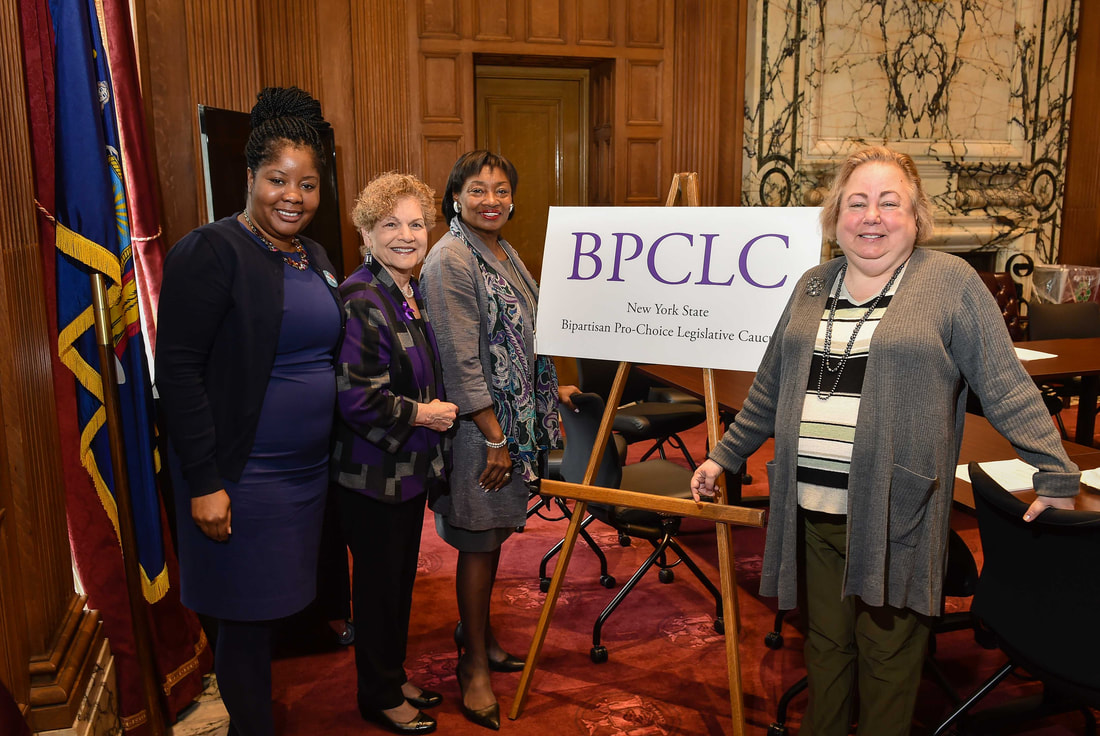 Jennifer Driver with BPCLC Co-Chairs Assemblywoman Ellen Jaffee, Majority Leader Andrea Stewart-Cousins, and Senator Liz Krueger 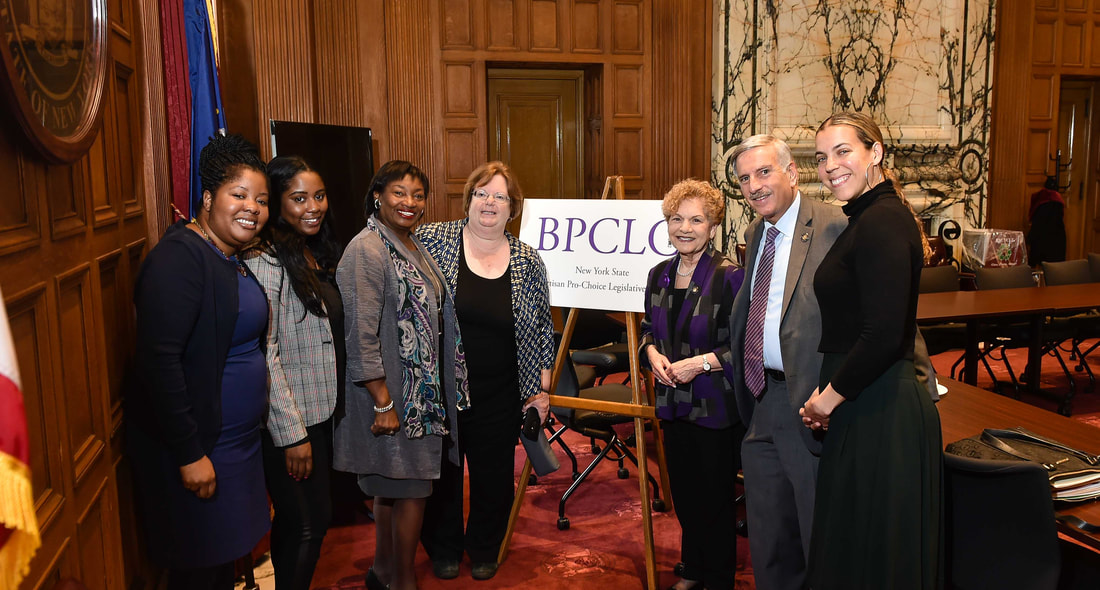 Jennifer Driver, BPCLC Co-Chair Majority Leader Andrea Stewart-Cousins, Assemblywoman Catherine Nolan,
BPCLC Co-Chair Assemblywoman Ellen Jaffee, Assemblyman David Weprin, and Robin Chappelle Golston
New York - Since the Reproductive Health Act (RHA) was passed and signed into law on January 22nd, there has been a lot of misinformation circulated about what the law allows and its implications. To help dispel false information, the office of BPCLC Co-Chair Senator Liz Krueger has issued Frequently Asked Questions about the RHA:
Frequently Asked Questions ... by on Scribd Albany - On Tuesday, January 22nd, the 46th anniversary of Roe v. Wade, the Reproductive Health Act (RHA) was passed in the New York State Senate and Assembly, and was signed into law by Governor Andrew Cuomo. After many years of being blocked in the Senate, today New York State legislators voted to codify Roe v. Wade protections into state law and ensure access to safe, legal abortion. Thanks go to BPCLC members Majority Leader Andrea Stewart-Cousins, Senator Liz Krueger, and Assemblywoman Deborah Glick for sponsoring the RHA in the Senate and the Assembly; to Majority Leader Andrea Stewart-Cousins, Speaker Carl Heastie, Lieutenant Governor Kathy Hochul, and Governor Andrew Cuomo for their leadership; and to the advocacy groups and community activists who worked tirelessly to protect abortion rights in New York State! Majority Leader Andrea Stewart-Cousins, BPCLC Co-Chair and Co-Prime Sponsor of the RHA, makes remarks at the Reproductive Health Act Press Conference Senator Liz Krueger, BPCLC Co-Chair and Co-Prime Sponsor of the RHA, makes remarks at the Reproductive Health Act Press Conference Assemblywoman Deborah Glick, BPCLC Member and Sponsor of the RHA, makes remarks at the Reproductive Health Act Press Conference Assemblywoman Deborah Glick, BPCLC Member and Sponsor of the RHA, provides an overview of the RHA on the Assembly floor Senator Liz Krueger, BPCLC Co-Chair and Co-Prime Sponsor of the RHA, explains her vote. Majority Leader Andrea Stewart-Cousins, BPCLC Co-Chair and Co-Prime Sponsor of the RHA, explains her vote.
Albany - Today, Senate Majority Leader Andrea Stewart-Cousins, Senator Liz Krueger, and Assemblywoman Ellen Jaffee submitted a BPCLC public comment letter opposing the Trump administration's Patient Protection and Affordable Care Act; Exchange Program Integrity proposed rule.
In the name of promoting program integrity, this proposed rule would require health insurance plans that cover abortion services to issue two monthly premium bills: one for abortion services and the second for all other health care services. This means that policy holders would have to make two health insurance premium payments on time each month in order to maintain coverage. This proposed rule is harmful because it could result in higher health insurance premiums; insurance providers dropping abortion coverage; lack of access to safe, legal abortion; increased utilization of emergency room services; and surges in health care expenses, as well as increased rates of poverty and bankruptcy; maternal morbidity and mortality; and infertility. BPCLC Public Comment Letter... by on Scribd New York - Today, BPCLC's Majority Leader Andrea Stewart Cousins, Senator Liz Krueger, and Assemblywoman Deborah Glick joined Governor Andrew Cuomo, former Secretary of State Hillary Clinton, Lieutenant Governor Kathy Hochul, State and Federal Legislators, and reproductive rights advocates to speak in support of passing the Reproductive Health Act (RHA). BPCLC Co-Chair and RHA Co-Prime Sponsor in the Senate, Majority Leader Andrea Stewart-Cousins BPCLC Co-Chair and RHA Co-Prime Sponsor in the Senate, Senator Liz Krueger RHA Sponsor in the Assembly, Assemblywoman Deborah Glick
|
Archives
June 2023
Categories |
Proudly powered by Weebly
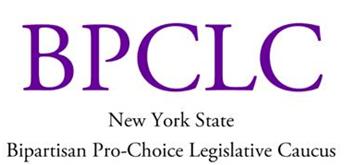
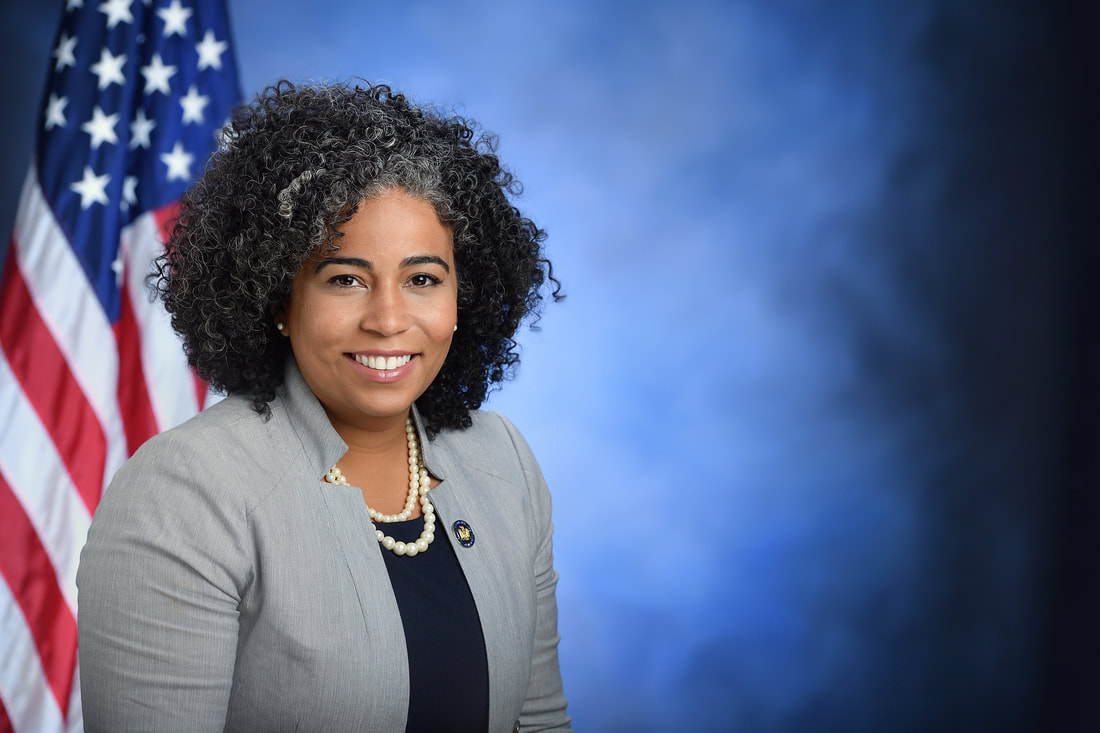
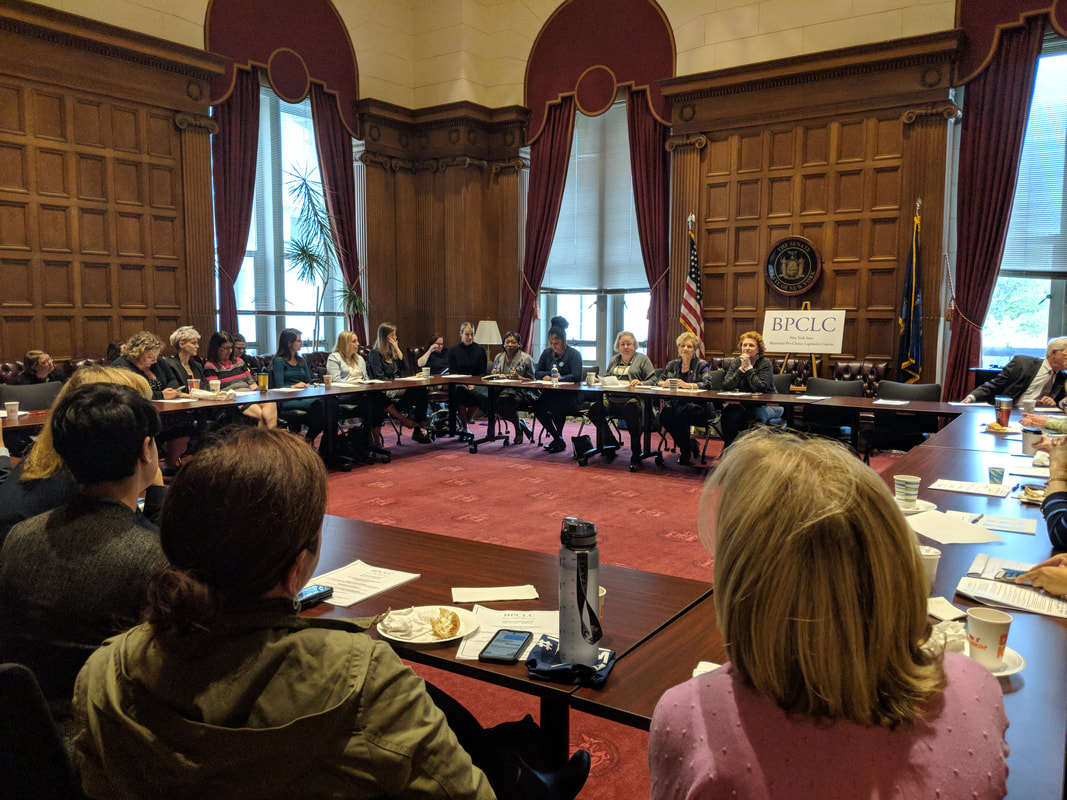
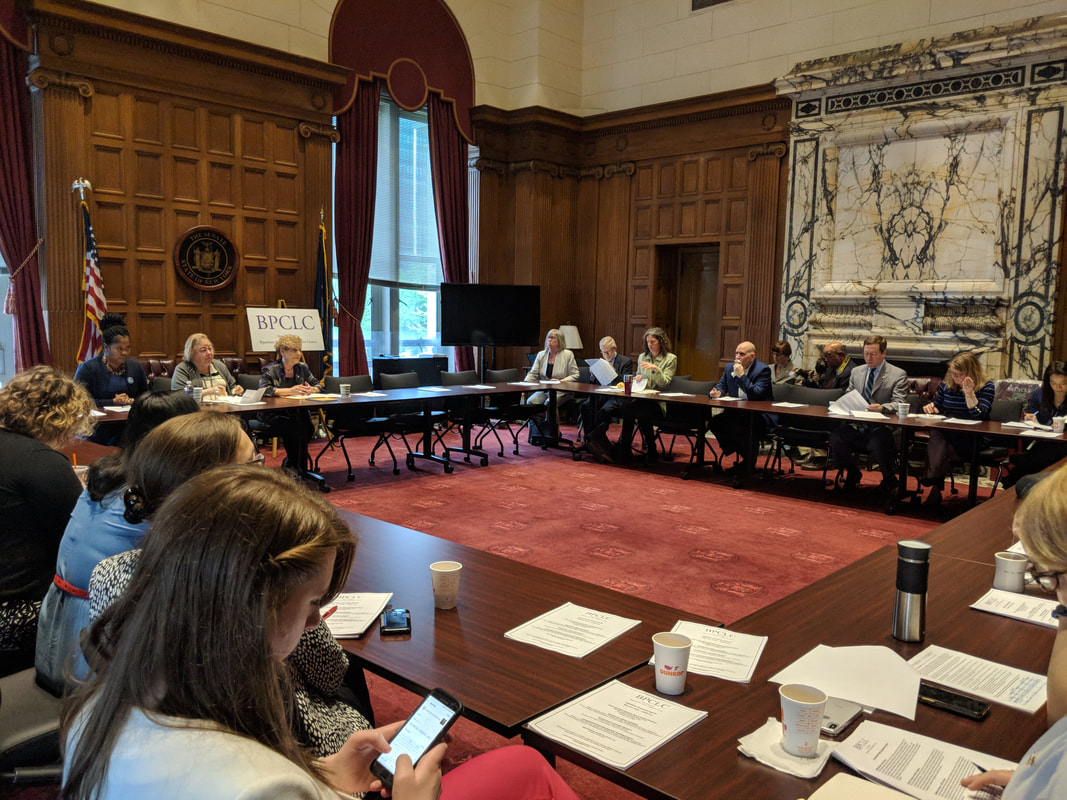
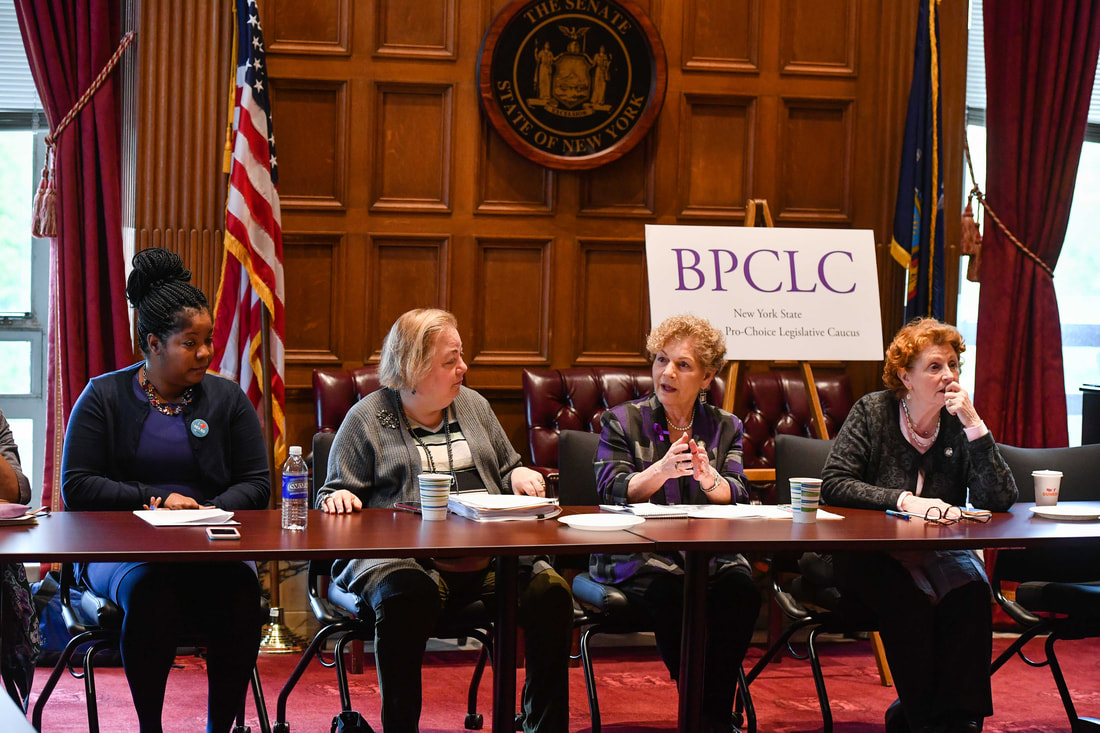

 RSS Feed
RSS Feed